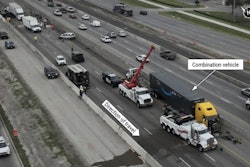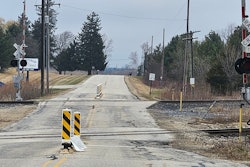Trucking news and briefs for Tuesday, April 15, 2025:
Massachusetts gives manufacturers flexibility on ACT enforcement
The Massachusetts Department of Environmental Protection (MassDEP) on Monday announced it will exercise enforcement discretion for manufacturers that are unable to meet minimum electric truck sales required under the Advanced Clean Trucks (ACT) regulation.
Manufacturers that cannot meet the sales requirements of the reg will receive relief for model years 2025 and 2026, provided they make internal combustion engine (ICE) trucks available to distributors seeking them. This approach gives manufacturers more flexibility and eases the challenges dealers are facing, while keeping the state on track to achieve critically important emissions reductions, MassDEP said.
In addition to making ICE trucks available to dealers, manufacturers must continue investing in their manufacturing and distribution networks to ensure a smooth transition to electric trucks, MassDEP said.
Under the ACT program, adopted from the California Air Resources Board, manufacturers are required to achieve a certain level of electric truck sales as a percentage of their overall sales.
As Overdrive sister publication Trucks, Parts, Service reported in March, Massachusetts was one of five states to implement California’s ACT rule on Jan. 1, 2025. First introduced last year in California, the ACT rule requires OEMs to sell zero-emission vehicles (ZEV) to gain access to credits to make corresponding internal combustion diesel engine sales. The rule has been under fire from trucking groups since its inception due to its requirements, with many dealer and state trucking associations citing the lack of demand for ZEVs as a barrier eliminating the sale of new clean diesel trucks.

Percentages of electric-truck sales under the terms of the rule are required to gradually increase year over year. Manufacturers can average those sales over time and buy and sell credits to meet the requirements.
CARB's waiver for its Advanced Clean Trucks rule, issued by the Environmental Protection Agency, is under scrutiny from the Trump Administration's EPA, as well as from Congress.
For now, local and state associations in Massachusetts applauded the ACT enforcement delay in the state. Yet as TPS reported, the announcement may be a short-term win for trucking but doesn't eliminate ACT’s ultimate electric-truck sales mandate in the commonwealth. MassDEP reported to TPS Monday that OEMs will still be required to comply meet ZEV sales requirements beginning with the 2027 model year.
Beyond this change, Massachusetts appears to remain committed to its ACT rule.
Established with input from the manufacturing sector, MassDEP states the ACT rule will improve air quality in Massachusetts communities, while also helping to reduce emissions from the transportation sector.
[Related: Congress moves to overturn EPA's CARB emissions waivers]
Volvo issues recall over hazard light switch
Volvo Trucks North America is recalling more than 5,000 trucks due to a lighting issue with the hazard switch on the dash, according to National Highway Traffic Safety Administration documents.
The recall includes 5,257 model year 2023-’26 Volvo VN tractors. In the affected units, the back lighting on the hazard switch may become inoperative during operation of the truck. As such, these vehicles fail to comply with the requirements of Federal Motor Vehicle Safety Standard (FMVSS) number 101, "Controls and Displays."
Volvo dealers will update the vehicle master control unit (VMCU) software, free of charge. Owner notification letters are expected to be mailed June 1. Owners can contact Volvo Trucks' customer service at 800-528-6586 with recall number RVXX2503. NHTSA’s recall number is 25V-214.
FMCSA approves two fleets’ requests to allow pulsating brake light modules
Two trucking companies have received exemptions from the Federal Motor Carrier Safety Administration that allow them to install Intellistop brake-light modules on their equipment.
The waivers were granted to Casey’s Services Company, a 526-truck fleet based in Iowa, and Coffeyville Resources Crude Transportation, a 185-truck fleet out of Oklahoma.
The Intellistop module is designed to pulse the required rear clearance, identification and brake lamps from a lower-level lighting intensity to a higher-level lighting intensity four times in two seconds when the brakes are applied, and then return the lights to a steady-burning state while the brakes remain engaged.
For Casey’s, the waiver allows the fleet to install the modules on no more than 25% of its trucks and trailers during the first year of the waiver, and no more than 50% of its trucks and trailers during the second year.
Coffeyville’s waiver limits installation of the modules to 25% of its trucks and trailers in its Clean Products division in the first year, and 50% of the equipment in the division in the second year.
Both waivers are effective for five years through April 16, 2030.
Each waiver requires a number of reporting requirements for the fleets to provide information to FMCSA about the operation of trucks equipped with the modules.
[Related: Crude oil transportation fleet seeks waiver to add pulsating brake light module]
Pilot opens new location in Alabama
A brand-new Pilot travel center is now open along I-22 in Winfield, Alabama, at Exit 30.
The location features 77 truck parking spaces, eight diesel lanes, nine showers, a Southern Tire Mart service center and more.










